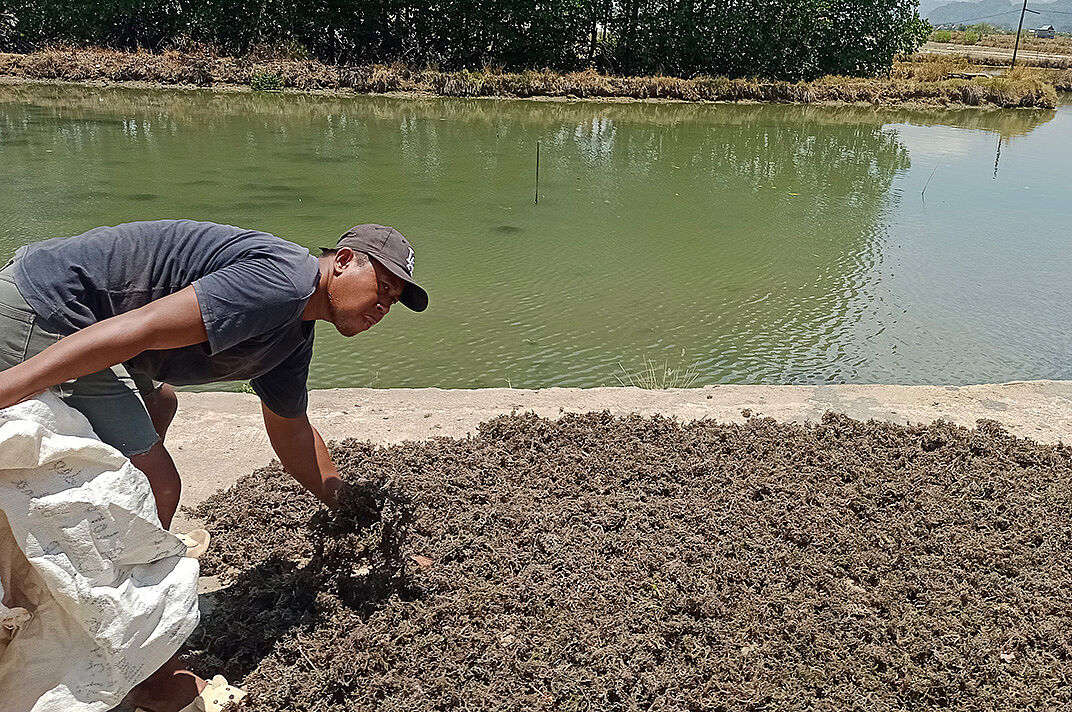Evangelische Bank eG
IBAN: DE85 5206 0410 0000 0001 24
BIC: GENODEF1EK1
Indonesia: Algae Against Poverty
Indonesia is a country with thousands of islands and countless coastal areas, but its economic potential through access to the sea is far from exhausted. The Christian Church in South Sulawesi (GKSS) is launching a project with a promising future that has many follow-on effects. Growing algae is eco-friendly, empowers Indonesian agricultural workers and, due to its interreligious basis, has a positive effect on social relationships.
Algae represent a climate-friendly raw material of the future with a wide range of uses ranging from bioplastics to superfoods. There will be rising global demand for algae in the coming years. And the best thing is, algae are a renewable resource and during their growth process, they bind large amounts of CO2, thus reducing greenhouse gases and cleaning the oceans.
In South Sulawesi, for example, a large part of the population lives from simple agricultural work or owns small businesses. Their income is low and often only covers their most basic needs. The increased use of the sea for cultivating algae would improve the financial situation of many households along the coastal strip and at the same time slow down climate change. The church's project is deliberately designed to be interreligious. Learning and working together should have a positive effect on interreligious coexistence in the predominantly Muslim population. These are the goals of the Christian Church in South Sulawesi (GKSS) with its project “Algae against Poverty”.
In 2025 and 2026, the church is organising workshops at two selected locations in the coastal region of Labakkang in South Sulawesi and supporting around 20 families to take over the cultivation and marketing of algae on their own responsibility. The church is seeking advice from experts in research and business. The workshop participants will learn how to select cultivation sites and how to plant, tend and harvest algae. To start the project off, the church will provide the cultivation containers and seeds. Learning how to cultivate their own seeds is also part of the training and this should enable the participants to continue running their small businesses independently after the funding period comes to an end. Until then, all participants will be supported by a professional and experienced team. The church is also helping to set up business relationships and providing information about self-employment and how to develop markets.
Indonesia
Indonesia is the world's second largest algae producer.

Long-term support for the economically disadvantaged
The project is aimed at people who are financially disadvantaged. The church is carefully selecting the project participants so that help reaches those who need it most. The plan is for each participant to produce around 2,500 kilograms of dried algae per year, which, at the current market price of 16,000 rupiah per kilogram (about €1 per kilogram), will provide a stable income.
The GKSS project is particularly convincing because of its many knock-on effects. Investment in the cultivation of algae has a promising future. The project will help participants to leave a life that is constantly on the brink of poverty and to work towards a financially sound existence. It will also protect nature and the environment and it will strengthen interreligious coexistence. Support this promising project and send your donation to “Algae against Poverty”.
The GKSS project aims to strengthen the financial situation of low-income families by creating a reliable source of income. Participants will be able to continue working independently through training and the development of active business relationships. In addition, an active contribution to climate protection will be made by investing in algae that is a renewable raw material and binds CO2.
The GKSS is organising workshops to teach project participants how to cultivate, tend and harvest algae. The workshops also cover marketing and sales. The training includes seed cultivation to increase their independence and improve their chances of making a profit. The church is providing the necessary materials to ensure a successful start, including growing containers and seeds. To sustain the project's lasting success, the Church not only consults with experts from research and industry but also helps the participants to set up business relationships.
The Christian Church in South Sulawesi (GKSS) lives and works in a Muslim environment. At the outbreak of World War II, the GKSS had about 10.000 members; in 1952, membership dropped to 600 people after two waves of persecution. Today, membership is back up to 6.000 congregation members. Although it is small, the GKSS has decided to offer self-help measures and missionary work in poor rural communities and runs a training centre for village development work.
We are pleased to hear that you are interested in this project. If you have any general questions, please use the contact form below. We are also happy to help you personally if you have any questions or require further information – by phone or by E-mail.
Djoko P. A. Wibowo
Liaison Secretary Indonesia
+49 711 636 78 -36